- Home
- Farley Mowat
Lost in the Barrens Page 7
Lost in the Barrens Read online
Page 7
But there was no time to waste. Working by day and by night, the hunters cut up their kill and covered the dwarf bushes with thin slices of meat laid out to dry. In a few days the dry meat was ready to pack into deerskin bags. Then Denikazi began his dash for home.
Traveling despite the mist and rain, the Indians had come a day’s journey from the lake of the slaughter, and on this night they were camped by the River of the Frozen Lake a scant ten miles downstream from the place where Awasin and Jamie were asleep.
It was well past midnight, and only one Indian was awake tending the fire. He had gone a few hundred feet from camp to collect more willow twigs when a slight sound made him glance up suspiciously.
The clouds that had obscured the moon dispersed, and a pallid white light poured down on the plains for a moment. In that brief instant the Indian saw a shape that made him stiffen with fear. He raced back to the sleeping camp calling a warning.
The camp woke to frenzied turmoil. The word “Eskimo” was on each man’s lips, for the terrified Indians were certain that the enemy was about to attack them. The watcher by the fire had only glimpsed “something” that might have been the fur-clad figure of a man, but in the tense state of nerves that afflicted all the Indians in those weeks spent on the edge of Eskimo country, this was enough. Heedless of darkness or of rapids, the Chipeweyan canoes were flung into the river and went flying up the stream. The Indians paddled as if they were pursued by devils. Well before dawn their canoes slid silently past the place where two boys slept, beside the dead ashes of their fire.
CHAPTER 12
River of the Frozen Lake
AT DAWN THE BOYS SCRAMBLED out of their deerskin robes. A light breeze rolled in over the plains from the northwest carrying with it a faint barnyard smell. Jamie sniffed the air curiously, wondering where the smell came from. He climbed a hill near camp and looked across the river. There were the great herds at last! They were moving south in a never-ending stream in long, twisting lines, each deer following the one ahead. Thirty or forty of these strings—some of them two miles long—were in sight at one time. They looked like giant brown snakes crossing a vast meadow.
From the river edge where he was getting water, Awasin called to his friend. “Come here!” he shouted. “I have something to show you!”
Jamie joined him, and Awasin pointed to the shoreline at his feet. Along it was a foot-wide band of whitish material that looked like a felt mat. It stretched out of sight, up and down the river, on both shores.
Jamie picked up a handful of the queer-looking stuff. “Why, this is deer hair!” he exclaimed.
Awasin grinned. “Do you think you could make a mattress of it?” he asked. “The old-time Chipeweyans used to.”
“Where did it all come from?” Jamie wanted to know.
“From the deer. Right now they are shedding their summer coats and the hair is loose. Somewhere upstream from us the herds are crossing the river, and they shed so much loose hair that it makes this mat along the riverbank for miles and miles.”
Jamie tried to imagine the numbers of deer that must be involved, but he found it beyond his power to estimate. That was not surprising. Down the valley of the River of the Frozen Lake more than a quarter of a million caribou were moving in the autumn flood toward the forests.
“Anyway it proves we must be on the right river,” Jamie said at last. “There couldn’t be more than one valley carrying so many deer. Shall we walk along the shore and see if we can find any signs of Denikazi?”
Taking only a small pack of meat, the boys set out upstream. For an hour they walked leisurely while on the opposite side of the river the endless flow of deer continued. Jamie noticed that they were mostly does and fawns and he asked Awasin about this.
“The does and fawns go first,” Awasin explained. “They seem to get restless for the forests early. But the bucks are different. When the mating season comes along in October they won’t have time to eat or rest for a whole month. So now they’re still up north putting on fat to carry them through the fall. They won’t start south for another couple of weeks—”
Jamie interrupted. “Look down there!” he shouted.
In a sheltered hollow by the riverbank below them was the unmistakable debris of a campsite. Wild with excitement, the boys scrambled down to what had been Denikazi’s first camp on the river during his journey north. The boys found many signs to indicate that the camp was not very old, but what really filled them with joy was the discovery of a little cache containing some dry fish, some tea, and a little bag of flour. Obviously this food had been intended for the homeward journey, and the fact that it was still untouched seemed to prove that Denikazi was still somewhere to the north.
Actually Denikazi and his men had slipped past this cache the previous night in their panic-striken flight. With their heavy load of meat they had no real need to pick up the cache. At this moment the Idthen Eldeli men were already beginning the long chain of portages back into Idthen-tua Lake.
Much relieved, and quite certain that they would be picked up in a day or so, the boys returned to their camp and spent the rest of the day waiting, resting, and gorging on caribou meat. They relaxed for the first time since the awful moment on the rapids near Stone House. Jamie’s leg benefited from the rest, and he found that he could again put his weight on it without pain.
At noon the next day the boys decided to go north and meet their rescuers along the shore.
The weather remained fair and they enjoyed the walk. Many birds were moving south. A flock of Canada geese rose from a tundra pond and beat heavily into the clear sky calling their haunting notes. Flocks of longspurs—little sparrowlike birds—rose in front of the boys like clouds of dust. Curlews and golden plover whistled and called from the riverbanks. Hundreds of family parties of ptarmigan cackled from the willow swales along the route. There was food in plenty, but the boys wasted no ammunition, for they still had enough deermeat to last a few days longer.
By evening, when they had found no further signs of the Indians, they began to feel distinctly uneasy. That night they slept fitfully. In the morning Jamie put their doubts into words.
“Do you think they might have gone home by a different route?” he asked suddenly.
“No,” Awasin replied stoutly. “They must still be down-river from us. We will walk for another day. We should find their camp, or see their canoes before nighttime.”
Impatience and worry made them hurry their pace. By late afternoon they had come in sight of a big lake. Knowing that the Idthen Eldeli hunters would have chosen the west shore where the deer were, the boys crossed the river at this point. The water was swift but not too deep and they managed to wade, and jump, across a shallow stretch. They had hardly climbed the opposite bank when they smelled a pungent odor.
“Something awful dead around here!” Jamie said, wrinkling his nose in disgust.
A short search showed them what it was. Behind a knoll lay a dead caribou that had obviously been shot. The find cheered the boys up amazingly.
Hurrying on, they made their way down the west shore of the lake in the last rays of the setting sun. Suddenly Awasin spotted a flicker of light far ahead. “Campfire!” he yelled.
Immediately, Jamie lifted the rifle and fired half a dozen signal shots. The sounds echoed off the hills on both sides of the river, but the signal went unanswered. Only a growing silence followed the dying away of the fusillade. Worst still, the distant flicker of light winked out and vanished.
The boys looked at each other in stunned silence.
“Maybe we scared them,” Jamie said hopefully. “After all, they don’t know we’re here. Maybe they think it was Eskimos shooting, and put out their fire on purpose.”
Both boys grasped at this explanation. There was no use trying to go farther that night and, if Jamie’s idea was correct, it might even be dangerous to blunder into the Idthen Eldeli party in darkness. So, not bothering to light a fire, the boys made camp and slept restlessly
under their blankets.
When Jamie awoke, Awasin was standing on a rock straining his eyes toward the north for signs of smoke from the Indians’ breakfast fires. There was no smoke. As far as the eye could see the long files of caribou moved unperturbedly down the valley. They saw all this with something near panic in their hearts. For they both knew that if there had been hunters to the north, the deer would have been disturbed.
“Come on,” Jamie said, “never mind breakfast. Let’s get going quick. If that was Denikazi’s fire we saw last night, we should reach his camp by noon. And if it wasn’t…well…” He did not finish the sentence. Already the terrible thought that they had somehow missed the Indians was becoming a certainty in the boys’ hearts.
They pushed forward at top speed. Shortly before noon as they came opposite a cliff on the western hills, a sudden flash of light caught their eyes. There could be no doubt what it was. Up on the cliff a sheet of quartz, or mica, was catching the sun’s rays and reflecting them like a bright mirror. With sinking hearts the boys understood that this must have been their “fire” of the evening before.
Fear mounted steadily in their hearts, but they pushed forward grimly. And in the early afternoon they came at last to the deer fence.
The gap was close to the lake shore, and the camp where the Chipeweyans had made their kill was near at hand. It did not take the boys long to discover it, or to read the ominous message it held for them. The remains of many caribou told the story of a successful hunt—some days before.
With sinking hearts they searched for some sign that the Indians might have gone on farther north. There was no such sign. Instead there was clear evidence that the Idthen Eldeli had stayed at this place only long enough to kill and prepare many deer—enough to fill their canoes to overloading. Remembering the urgent need for meat at the home camps, the boys could hope no longer. They knew now beyond a doubt that the hunters had gone home!
Jamie’s voice trembled when he spoke. “How could we have missed them, Awasin?” he cried. “How could we have?”
Awasin had no answer. He too was crushed by the knowledge that the rescue which had seemed so certain had now vanished utterly. He knew there was no hope that Denikazi would return even after he heard the boys were missing. If he searched for them at all it would be along the Kazon. They had made a gamble—now they knew that they had lost.
In order to avoid thinking about their desperate plight, Awasin busied himself lighting a fire from the heap of willows left behind by the Chipeweyans. Methodically he placed pieces of meat to cook before the flames. With the fatalism of his ancestors he refused to think about the mistakes which were past.
It was different with Jamie. The future was close to him, and terrifying. He knew that the nearest friends were three hundred miles away by canoe—and they had no canoe. Summer was coming to an end, and long before they could walk even a small part of the way home, winter would fall upon them and they would perish.
Jamie thought about his uncle, about Macnair Lake, and finally his restless thoughts came back to the Great Stone House—the cause of all the trouble. “It was my fault,” he thought. “I got Awasin into this.”
From his pocket he drew out the thin sheet of lead he had taken from the old Norse tomb. He was about to throw it away when something made him pause. His mood of depression seemed to lighten. Courage began to flow back into his heart, for he was thinking: “Those old Vikings—they sailed thousands of miles across the oceans in boats we wouldn’t dare to use even on Reindeer Lake! And they explored right into the Barrenlands a thousand or more years ago. Something hardly any white man has done since. They weren’t afraid of anything at all!”
Slowly he put the lead plate back in his pocket and stood up. He began to speak, and though his voice trembled a little he was in control of himself. Jamie Macnair was almost a man.
“We’d better face it, Awasin,” he said. “There isn’t a chance for us to get out of here alive before the winter comes. But if the Eskimos can live here all winter long, then so can we!”
Awasin smiled. Getting to his feet he shook himself, as if to clear away the grim forebodings that had lain over him. “That’s Cree talk, Jamie,” he said. “Good talk! You are right. If we can get food and clothes and shelter we will be all right. We can get all those things if we really try. Then, in the winter, we can make a sled, load it with meat for the journey, and head for home, cross-country.”
Awasin’s dark eyes glittered at the prospect of the arrival back at the Cree camps. He could see it in his mind. They would not be boys any longer, but hardened adventurers with such a tale to tell that even the old men of the tribe would listen with awe.
Jamie caught the enthusiasm in Awasin’s voice and he began to feel the challenge of the adventure. “We’ll trap white foxes,” he said excitedly. “When we get back we’ll be rich as well as famous.”
Ignoring the difficulties they would have to face, they squatted by the fire and talked. Plans were made, discarded, and made again. They talked until they were exhausted. Then the excitement drained away and the immense and lonely arctic plains closed in upon them once more. All the cheerful talk seemed now to be only dream-stuff.
The fire flared up brightly, and in the sudden spurt of light Awasin and Jamie looked at each other with intent eyes.
Suddenly Jamie jumped to his feet. “All right!” he said loudly. “We’ve made our brag. Now let’s live up to it!”
CHAPTER 13
Plans and Preparations
BY MORNING THE FIRST SHOCK OF their predicament had worn away and the boys were ready to meet reality. No amount of brave talk could hide the fact that they were faced with many months of living in one of the most inhospitable places in the world—and with nothing to help them except their wits and a pitifully small array of tools and weapons.
In order to survive at all they would have to stay in one place and devote all their energy to building up supplies of food, fuel, and caribou hides for clothing and for shelter. On foot, and ill-equipped, any attempt to break out to the south was doomed, for winter was almost due. When the snows came the Barrens would be indeed barren of food and shelter both.
Luckily the day broke clear and warm. The great plains looked almost friendly, and under the influence of the driving herds of deer, and the noisy movement of the birds, the boys managed to keep their spirits up and to begin their preparations.
The first task was to take stock of what they owned. There was the rifle, and ninety shells for it. There was a short hatchet, a long hunting knife, two smaller pocketknives, a strong fishline with a single hook, a length of gill net, a file, the paddle Jamie had used for a crutch, fifty feet of half-inch rope, a tin tea-billy, an old frying pan, the fire drill Awasin had made, the lead sheet from the Norse grave, and about ten pounds of dried fish and fresh deermeat. In addition there were their worn blankets, and the clothes the boys were wearing. Their rubbers and moccasins were almost ruined by the long trek overland, and their trousers and jackets were thin and torn in many places.
All in all, it was not a very impressive outfit, but Awasin was cheerful. “It may not be all we want,” he said, “but with this to start with, we can get everything we need from the country. We can kill deer—and deer can give us a lot more things than food and clothing.”
Jamie glanced over his shoulder toward the gap in the deer fence, through which a steady stream of does and fawns was moving. “Hadn’t we better start shooting then?” he asked anxiously. “Maybe the deer will be gone soon.”
Jamie’s anxiety was natural. It seemed impossible that such numbers of caribou could continue moving out of the north for much longer. And it was clear that the caribou were the key to life itself, as far as the boys were concerned.
Awasin shook his head. Then he explained why there was no great hurry to slaughter deer. In the first place it would be much harder to preserve the meat now than it would be if they waited until cold weather came and the meat could be frozen. Even
more important was the fact that the great bucks—which were still to come—were far more valuable than does. The hide of the bucks was tougher and better for many things, and the bucks were fatter. This was vitally important, for a great deal of fat must be eaten by anyone who tries to survive a northern winter on a strictly meat diet. Fat could also be burned in crude lamps, and in a land where the winter night is long some kind of light is essential.
Awasin’s idea was that they should shoot only a few deer at the moment, and save the precious ammunition till the migration of the bucks was at its height. Somewhat uneasily Jamie agreed to wait; then another question occurred to him.
“What’ll we do about wood to burn?” he asked.
This time Awasin was at a loss. It was clear that once the snows came, it would be nearly impossible to gather enough dwarf willow scrub for cooking, let alone for heating. And there appeared to be no other kind of wood about.
At last Awasin said, “Let us not fret about wood until we can think of an answer. Let’s take one problem at a time.”
“Well, then,” Jamie said, “I guess we need some kind of shelter first; then enough food to last until the bucks arrive, and maybe enough skins for some kind of clothing. It won’t be too long before the frosts hit us.”
Awasin stood up and took hold of the rifle. “The deer will give us all three things,” he answered. “Let’s go hunting.”
The boys walked along the line of stone pillars until they reached the gap. The deer saw them approach and veered off uneasily to mill about some distance from the fence. They were not seriously frightened, though, and they were very anxious to pass the fence and continue on their journey south.
The boys slid into a hiding place made of stones piled in a circle near the mouth of the gap, and crouched out of sight. There was no wind to carry their scent to the deer, and in a few moments the herds began to press forward again. The leaders came cautiously, stepping high and holding their nostrils up as they took great snorting breaths to test the air for danger.

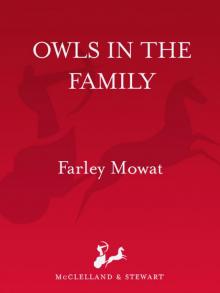 Owls in the Family
Owls in the Family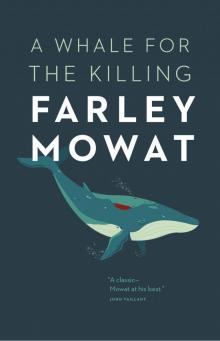 A Whale for the Killing
A Whale for the Killing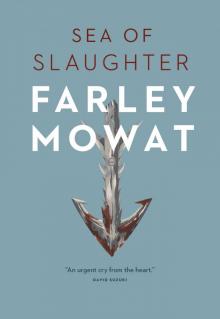 Sea of Slaughter
Sea of Slaughter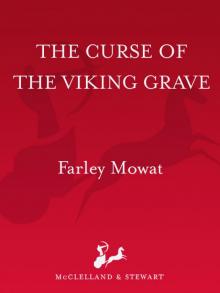 The Curse of the Viking Grave
The Curse of the Viking Grave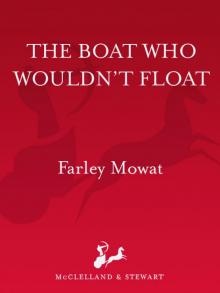 The Boat Who Wouldn't Float
The Boat Who Wouldn't Float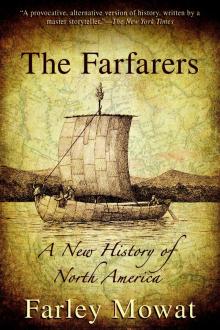 The Farfarers: Before the Norse
The Farfarers: Before the Norse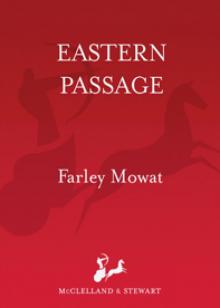 Memoir
Memoir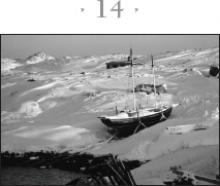 Bay of Spirits: A Love Story
Bay of Spirits: A Love Story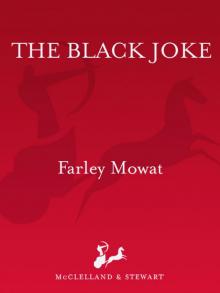 The Black Joke
The Black Joke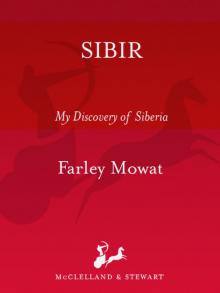 Sibir: My Discovery of Siberia
Sibir: My Discovery of Siberia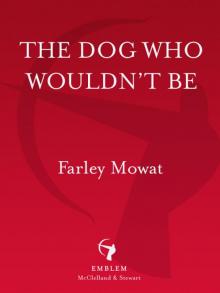 The Dog Who Wouldn't Be
The Dog Who Wouldn't Be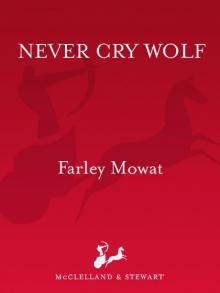 Never Cry Wolf
Never Cry Wolf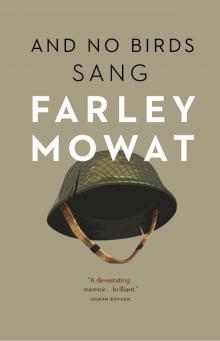 And No Birds Sang
And No Birds Sang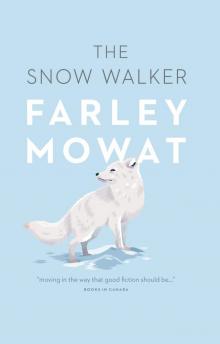 The Snow Walker
The Snow Walker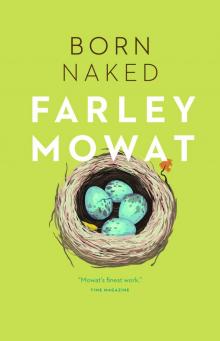 Born Naked: The Early Adventures of the Author of Never Cry Wolf
Born Naked: The Early Adventures of the Author of Never Cry Wolf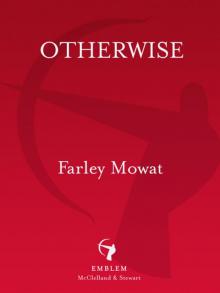 Otherwise
Otherwise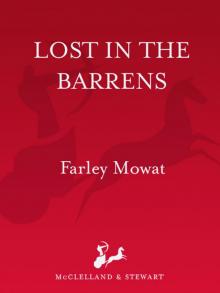 Lost in the Barrens
Lost in the Barrens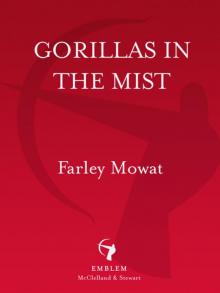 Gorillas in the Mist
Gorillas in the Mist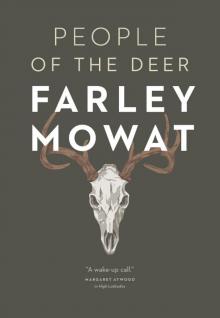 People of the Deer
People of the Deer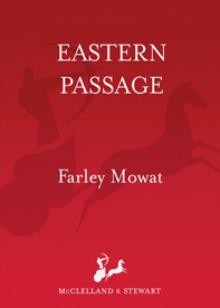 Eastern Passage
Eastern Passage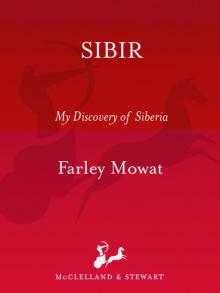 Sibir
Sibir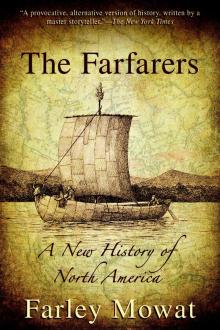 The Farfarers
The Farfarers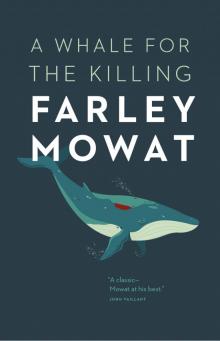 A Whale For The Killing (v5.0)
A Whale For The Killing (v5.0)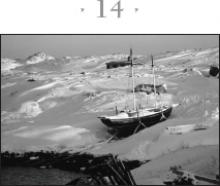 Bay of Spirits
Bay of Spirits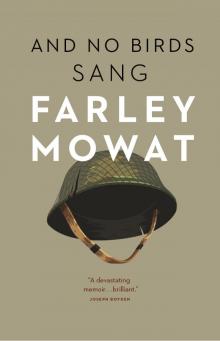 And No Birds Sang (v5.0)
And No Birds Sang (v5.0)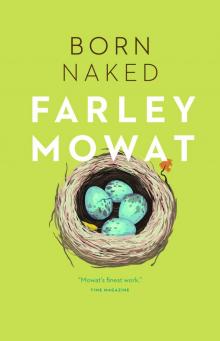 Born Naked
Born Naked